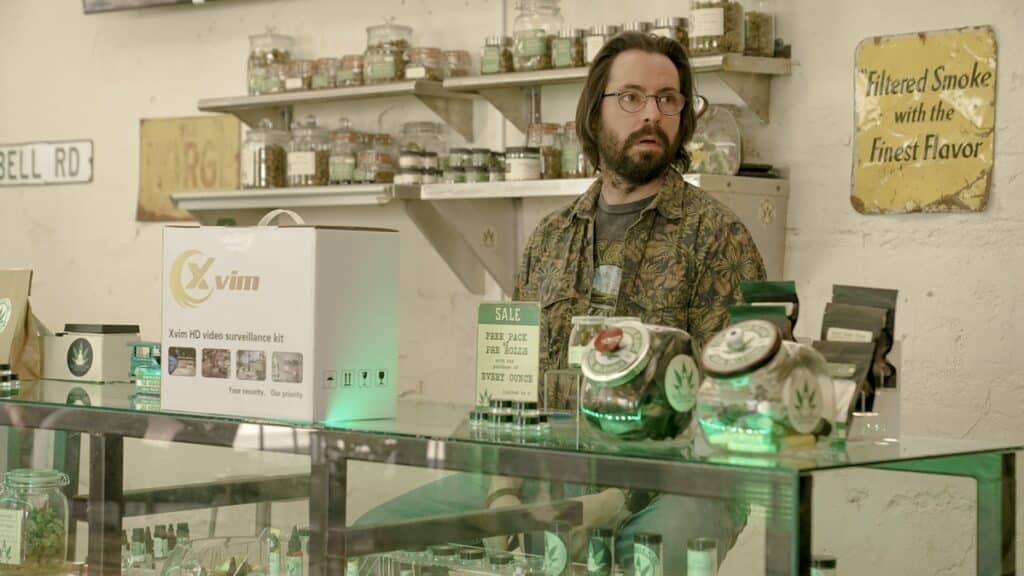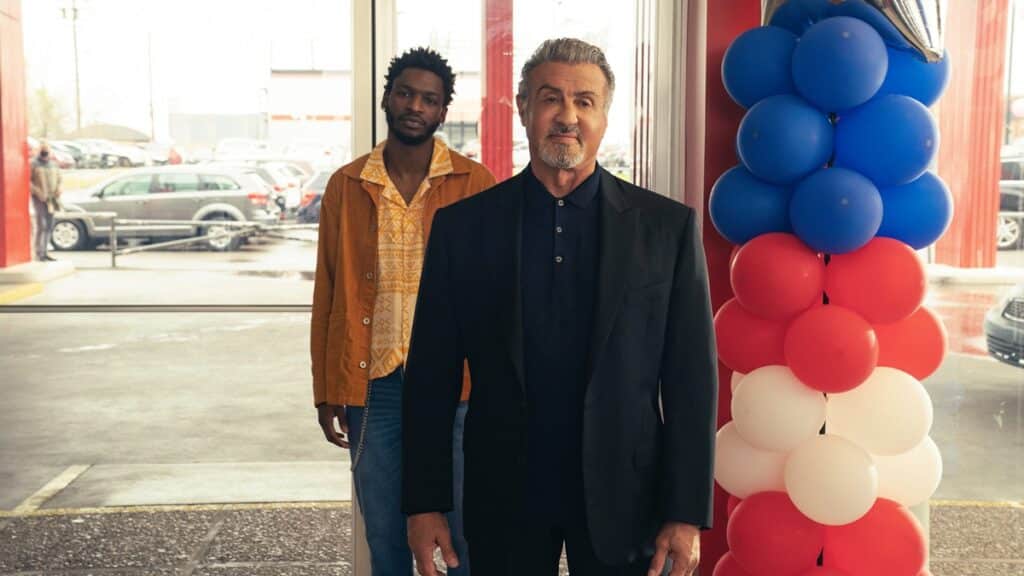Despite pedigreed showrunners and a compelling performance by Stallone, Tulsa King doesn’t bring anything new to the crime drama except its setting.
In pop culture, The Mafia is as intertwined with New York as it is with Italian heritage. As a result, the idea of having a show about the Mafia taking place outside of the East Coast is novel. That’s especially if it takes place in an explicitly un-NYC location like Tulsa. Unfortunately, the premise of having a Mafioso in Oklahoma is the only original thing about Taylor Sheridan’s (Yellowstone) latest crime drama, Tulsa King.
Dwight “The General” Manfredi (Sylvester Stallone) is a caporegime for the Mafia. He just finished 25 years in the slammer after taking the fall for his boss. However, upon his release, he’s sent to Tulsa, Oklahoma awaty from his Big Apple crime family.
Disappointed but not deterred, Dwight immediately starts to build a criminal empire. And when I say immediately, I mean it. Within minutes of landing in Tulsa, he recruits his taxi driver Tyson (Jay Will) as his personal driver and assistant. He also convinces Bhodi (Martin Starr), a dispensary owner, to partner with him. All it takes is knocking out the dispensary’s security guard and threatening to break Bohdi’s foot.

Why the owner of a legal dispensary would want to hire a mafioso for “protection” instead of just calling the cops goes unexplained. Perhaps Dwight’s really just that persuasive. It also helps that Dwight acts, essentially, as a wish-fulfillment character. He goes through Tulsa, inflicting violence on people with no repercussions. When not punching people, the enforcer’s instantly charming them, including a younger woman, Stacey Beale (Andrea Savage). She’s, of course, shocked when she discovers he’s seventy-five. Surely, he must be twenty years younger! Dwight overcomes every potential setback almost immediately, making it hard to sympathize with his plight.
To be fair, critics were only provided two episodes to review. By the conclusion of the second, there are hints that things could get a lot more complicated for Dwight as the season progresses. Still, it’s shocking that a show with two accomplished showrunners (the aforementioned Sheridan and Terence Winter, a showrunner for The Sopranos and Boardwalk Empire) could have such a flat start. These opening episodes are little more than Dwight collecting his posse and marveling at how much the world has changed since 1997.
[A]ll viewers get initially are setups without hooks, characters as power fantasy, and tired jokes.
Unsurprisingly, the culture shock that Dwight experiences after being in jail for a quarter of a century–particularly as paired with being a New Yorker in Tulsa–is a major part of the show. His adjustment to life outside of prison informs most humor. Sometimes it works. For example, a scene where Dwight gives the DMV his profile when he gets his picture taken for his license somehow finds new laughs in that well-trod location. Mostly, however, it’s tired jokes about apps, the lack of places that take cash, and how more people are gay and use they/them pronouns. It’s typical boomer humor without any real spin to it.
Still, Stallone does his best to sell the humor. It often doesn’t land, but he does bring a charm to his performance. The actor invests Dwight with an effortless bravado, an old-school sort of swagger that manages to be both frighteningly menacing and genuinely affable. Stallone also shows a softer side of the character as he tries to get in contact with his estranged daughter. It’s a charismatic performance that makes Tulsa King more compelling.

Unfortunately, the supporting cast lacks any such nuance. Will brings jovial energy to Tyson but lacks much motivation outside of making money. Starr’s portrayal of Bohdi is, unfortunately, muted for comic relief. Hopefully, this will change, but in the first two episodes, everyone has little more to do than react to Dwight.
One thing the show does serve well is the city of Tulsa. As someone born and lived in Tulsa, I was pleasantly surprised to find Tulsa King actually filmed in the city. For the most part, the depiction feels authentic, with references to surrounding towns and many exteriors filmed in the downtown area. Unfortunately, Tulsa’s residents don’t fare as well. Tulsa King portrays a very specific view of the city, with a significant focus on cowboy culture. With few exceptions, Tulsans are rendered as either religious or redneck unless they’re Gen Z or Millenials. Obviously, that’s a large demographic in the area, but it becomes a little jarring when Dwight moves to the historic Mayo Hotel in a part of the city more hipster than honkytonk.
While it may be a slightly myopic view of Tulsa’s people, one has to give props to the series for going full-on with its conceit. Unfortunately, the first two episodes fail to live up to the premise’s promise. Even with hints of an engaging storyline ahead, all viewers get initially are setups without hooks, characters as power fantasy, and tired jokes. Tulsa is a great city and a great setting for a show. Unfortunately, Tulsa King isn’t that show.
Tulsa King gets that crimewave rolling November 13 on Paramount+.
Tulsa King Trailer
Read next: The Spool's Best New Releases
Streaming guides
The Best Live TV Streaming Services With Free Trial
The praises of live TV streaming services don’t need to be further sung. By now, we all know that compared to clunky, commitment-heavy cable, live TV is cheaper and much easier to manage. But just in case you’re still on the fence about jumping over to the other side, or if you’re just unhappy with ... The Best Live TV Streaming Services With Free Trial
How to Watch Power Book III: Raising Kanan Season 3
Season 3 of the hotly anticipated Power spin-off, Power Book III: Raising Kanan, is arriving on Starz soon, so you know what that means: it’s the ’90s again in The Southside, and we’re back with the Thomas family as they navigate the ins and outs of the criminal underworld they’re helping build. Mekai Curtis is ... How to Watch Power Book III: Raising Kanan Season 3
How to Watch Doctor Who: 60th Anniversary Specials
Ladies and gentlemen, we’re so back! To celebrate Doctor Who’s 60th anniversary, the BBC is producing a three-episode special starring none other than the Tenth/Fourteenth Doctor himself, David Tennant. And to the supreme delight of fans (that would be me, dear reader), the Doctor will be joined by old-time companion Donna Noble (Catherine Tate) and ... How to Watch Doctor Who: 60th Anniversary Specials
Which Netflix Country has Interstellar?
Maybe you’ve just seen Oppenheimer and have the strongest urge to marathon—or more fun yet, rank!—all of Christopher Nolan’s films. Or maybe you’re one of the few who haven’t seen Interstellar yet. If you are, then you should change that immediately; the dystopian epic is one of Nolan’s best, and with that incredible twist in ... Which Netflix Country has Interstellar?
Which Netflix Country Has Each Movie of The Hunger Games?
For whatever reason, The Hunger Games series isn’t available in the same countries around the world. You’ll find the first and second (aka the best) installments in Hong Kong, for instance, but not the third and fourth. It’s a frustrating dilemma, especially if you don’t even have a single entry in your region, which is ... Which Netflix Country Has Each Movie of The Hunger Games?
How to Watch ESPN With A Free Trial
One of the major concerns people have before cutting the cord is potentially losing access to live sports. But the great thing about live TV streaming services is that you never lose that access. Minus the contracts and complications of cable, these streaming services connect you to a host of live channels, including ESPN. So ... How to Watch ESPN With A Free Trial
How to Watch Paramount Network With a Free Trial
To date, Paramount Network has only two original shows on air right now: Yellowstone and Bar Rescue. The network seems to have its hands full with on-demand streaming service Paramount+, which is constantly stacked with a fresh supply of new shows. But Yellowstone and Bar Rescue are so sturdy and expansive that the network doesn’t ... How to Watch Paramount Network With a Free Trial
How to Watch WE TV With a Free Trial
Previously “Women’s Entertainment,” We TV has since rebranded to accurately reflect its name and be a more inclusive lifestyle channel. It’s home to addictive reality gems like Bold and Bougie, Bridezillas, Marriage Boot Camp, and The Untold Stories of Hip Hop. And when it’s not airing original titles, it has on syndicated shows like 9-1-1, ... How to Watch WE TV With a Free Trial
How to Watch Comedy Central With a Free Trial
It’s no coincidence that many of today’s biggest comedians found their footing on Comedy Central: the channel is a bastion of emerging comic talents. It served as a playground for people like Nathan Fielder (Fielder For You), Ilana Glazer and Abbi Jacobson (Broad City), Tim Robinson (Detroiters), and Dave Chappelle (Chappelle’s Show) before they shot ... How to Watch Comedy Central With a Free Trial
How to Watch FX With a Free Trial
You’d be hard-pressed to find a bad show airing on FX. The channel has made a name for itself as a bastion of high-brow TV, along with HBO and AMC. It’s produced shows like Atlanta, Fargo, The Americans, Archer, and more recently, Shogun. But because it’s owned by Disney, it still airs several blockbusters in ... How to Watch FX With a Free Trial
How to Watch TNT Sports With A Free Trial
For many sports fans, TNT is a non-negotiable. It broadcasts NBA, MLB, NHL, college basketball, and All Elite Wrestling matches. And, as a bonus, it also has reruns of shows like Supernatural, Charmed, and NCIS, as well as films like The Avengers, Dune, and Justice League. But while TNT used to be a cable staple, ... How to Watch TNT Sports With A Free Trial